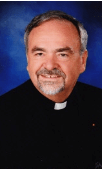Father Paul Bossi is the Pastor at Blessed Sacrament Roman Catholic Church in Buffalo, NY. He has been involved in organizing since the 1970s, and with VOICE-Buffalo since the mid 1990s. He has been a clergyman for 47 years.
 What is your current involvement with Gamaliel?
What is your current involvement with Gamaliel?
I’m on the Executive Committee of VOICE-Buffalo and I am the Pastor of Blessed Sacrament Roman Catholic Church.
How did you get involved with Gamaliel?
When VOICE-Buffalo started, we were looking for an organization like Gamaliel to help us organize and also to find an organizer. I became involved in 1994-1995, and after being transferred to a different church, I got re-involved in 1997 to the present.
What are some of your recent accomplishments?
One of our present efforts includes working for “restorative justice.” In prisons, in our schools, we are establishing peace circles. Another effort is to work with our county to restore an early release program for nonviolent, incarcerated people, which was dropped in 2005 because of budget cuts. With the help of the sheriff, the county executive, and the mayor we’ve had two large public meetings, which included 400 to 500 people. Our organizing on this issue has been quite a success, and are efforts are bring about a change.
Over the last 15 years, VOICE-Buffalo has gone through quite a few transitions. Building our membership over the past 2-3 years by working with some of the churches from the East Side of Buffalo, which is predominantly African American, has increased our membership with at least 20 new congregations.
There are groups that have been working with youth and against youth violence, and so we’ve been involved with helping them organize and raise funds, also working with a group called “peacemakers.” It all has to do with being available and helping the congregations train people to reach out to the at-risk youth.
What are you currently working on?
One of the big projects is developing new relationships with the Catholic Churches and Episcopal Churches. Especially with the Episcopal Churches, we found their new bishop to be very interested in having their churches involved in social justice issues, and having pastors and the laypeople go through training with Voice-Buffalo and the National Gamaliel training.
Another current activity of Voice-Buffalo is developing new contacts and reaching out to as many congregations of independent churches, with the hope to have at least 60 new congregations join us by the end of the year.
Another issue is our involvement with the Buffalo Public school system. It is dealing with some very serious problems like low graduating levels, and high drop out rates of students. With the possible closings of high schools, our assistant organizer has been helping organize parents in various schools to help them become more involved in planning the future of their schools so that the School Board will know what the parent’s wishes are.
Do you have a goal that you are working towards for 2015?
A number of years ago we were working for greater economic development in our county. We’re going to revise some of those ideas by working with the county executive to promote jobs, and job opportunities in the area, and also by working with some of the social organizations, unions, developers, and politicians to promote these ideas. A lot of the effort has to do with creating a good atmosphere of cooperation.
How did you reach your leadership position within Gamaliel?
Back in the 1970s I went through training with the Industrial Areas Foundation, and that gave me my first awareness of what organizing can do. So when VOICE-Buffalo started, I wanted to be involved. So I’ve had an interest in organizing for a long time.
How do you want people to view you as an organizer?
We have a very strong core team here in our parish; and for me it’s just by sharing with people a vision for a better community, a vision for a better tomorrow. When you share that vision for what can be improved, that’s what organizing is all about. Let’s invite people to look at problems. Let’s see how we can improve bad situations. By getting together with all sorts of people, and talking and listening to people, training and teaching people to do the same through the one-on-one process brings great leadership in our communities. I like to be involved with that. I encourage National Training, so that we can build up a new generation of leaders to carry the ball. I think it’s the same in any church community.
So I try to encourage pastors to look at the benefits of having strong leadership in their congregations and to help people find their hidden talents and abilities, and their power to change things. That’s actually the exciting part about organizing: giving opportunities to people to really come forward and get involved.
How has your faith inspired your leadership position?
Being a clergyman for 47 years, my life since the early 1960s has been very much involved with living out my faith. Knowing what it means to build up the Kingdom of God, and what the Kingdom of God should look like. I have great respect for all communities that want to grow to have greater compassion, kindness, and love as they reach out to others. Certainly working for justice for those on the margins of society or those who are poor, strengthens my own faith.
I have been motivated throughout my life by the powerful words of the Scriptures and the teachings of Jesus to be a man for others. And so you see, at 71 years old, I still have a great desire to do all that I can to build up the kingdom of God.